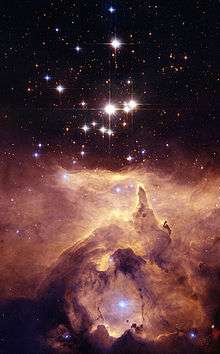nebula
English

An emission nebula
Etymology
Borrowed from Latin nebula (“little cloud, mist”). Akin to Ancient Greek νεφέλη (nephélē, “cloud”) (Modern Greek νεφέλη (neféli)), German Nebel (“mist, nebula”), Old Norse nifl, Polish niebo (“sky", heaven”).
Pronunciation
- enPR: neb'jə-lə, IPA(key): /ˈnebjələ/
Audio (US) (file)
Noun
Derived terms
Derived terms
- dark nebula
- diffuse nebula
- emission nebula
- planetary nebula
- preplanetary nebula
- protoplanetary nebula
- reflection nebula
- solar nebula
- stellar nebula
Related terms
Translations
a space cloud
|
|
See also
- plerion
- nova remnant
- supernova remnant
- Herbig-Haro object
- Bok globule
- interstellar cloud
- intergalactic cloud
- high velocity cloud
Italian
Latin
Etymology
From Proto-Indo-European *nébʰos (“cloud”). Cognate with Ancient Greek νέφος (néphos), νεφέλη (nephélē), Old High German nebul, Sanskrit नभस् (nábhas).
Pronunciation
- (Classical) IPA(key): /ˈne.bu.la/, [ˈnɛ.bʊ.ɫa]
Inflection
First declension.
| Case | Singular | Plural |
|---|---|---|
| Nominative | nebula | nebulae |
| Genitive | nebulae | nebulārum |
| Dative | nebulae | nebulīs |
| Accusative | nebulam | nebulās |
| Ablative | nebulā | nebulīs |
| Vocative | nebula | nebulae |
Synonyms
Derived terms
Descendants
- Albanian: njegull
- Aromanian: negurã
- Catalan: neula
- English: nebula
- Galician: néboa, nebra
- Italian: nebbia, nebula
- Kabuverdianu: nébua
- Occitan: nèbla
- Old French: niule, neble
- Papiamentu: neblina
- Portuguese: nevoeiro, névoa
- Romanian: negură
- Romansh: nebla, neabla
- Sardinian: nébida, neula
- Sicilian: negghia, nèula
- Spanish: niebla, neblina
- Venetian: nebia, nibia
References
- nebula in Charlton T. Lewis and Charles Short (1879) A Latin Dictionary, Oxford: Clarendon Press
- nebula in Charlton T. Lewis (1891) An Elementary Latin Dictionary, New York: Harper & Brothers
- nebula in Charles du Fresne du Cange’s Glossarium Mediæ et Infimæ Latinitatis (augmented edition, 1883–1887)
- nebula in Gaffiot, Félix (1934) Dictionnaire Illustré Latin-Français, Hachette
This article is issued from
Wiktionary.
The text is licensed under Creative
Commons - Attribution - Sharealike.
Additional terms may apply for the media files.